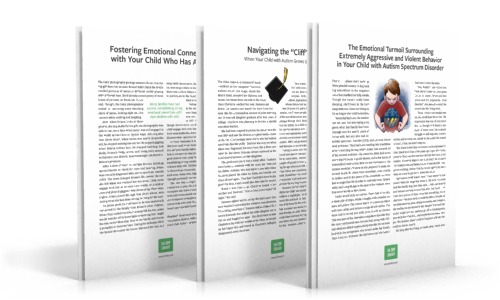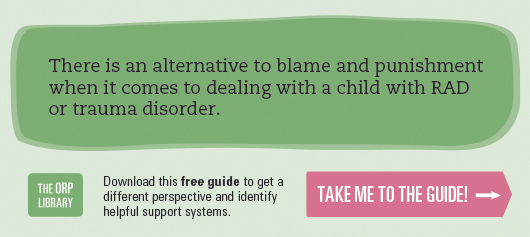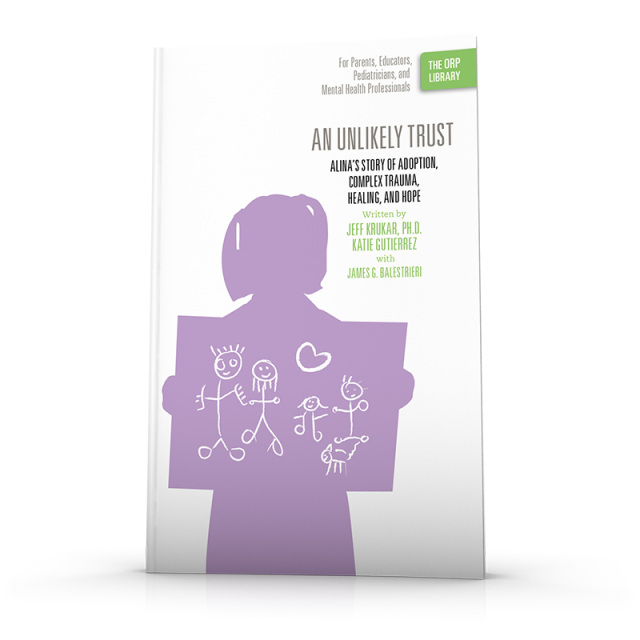Adopting a Child of Trauma: Gaining Perspective on What Your Child's Behavior and Rage Are Telling You
Written By: Aleksandra Corwin, Lizzie Vance
Resource Creation By: Bridget Morton
Design By: Sunny DiMartino, Christy Bui
Lori Hetzel could see that something was off the moment she pulled up in front of the school to pick up her two girls.
Delaney quickly climbed into the backseat. “I’m sorry again that I stepped on your foot,” she said quickly to her newly adopted sister, Nadya, while she wrestled with her backpack and jacket. “I’m really sorry.” Nadya slid in behind her and Delaney shrank against the window.
Lori’s heart started to race. She could hear the pleading in Delaney’s voice, could see the panic surging to her cheeks. Only a few days had passed since Nadya had slapped Delaney violently across the face. That rage had taken hours to quell, and the red marks and piercing screams had not yet faded from memory.
“It’s okay, Nadya, honey,” Lori said. “Delaney didn’t mean to do that. It was an accident.”
Nadya was climbing into her own booster seat, breathing heavily with eyes narrowed at Delaney, who cowered on her side of the car. At age nine, Nadya was two years older than her sister, but two inches shorter and 20 pounds lighter, a symptom of reactive attachment disorder. Despite her size, she was disproportionately strong when anger filled her tiny body. Now Nadya’s eyes glazed over as she grunted and kicked the back of the passenger seat.
Delaney whimpered. “Mommy, I’m scared. Make her stop!”
Lori met Delaney’s eyes. “Shhh, it’s okay, honey. Just climb up here in the front seat by me.” The whole car felt as though it were on the verge of erupting, and Lori wanted to act fast to keep both girls safe.
But as Delaney moved toward the center console to climb through, Nadya grabbed her by the shoulders and pushed her back into the seat, going from calm to full-blown raging in less than a minute. She started screaming.
Lori’s protective instincts kicked in, and she leaned back to push Nadya into her seat.
“Sit down,” she said, more calmly than she felt, to Nadya. She leaned back to hold Nadya in place. “Delaney, get up here!” Delaney scrambled into the passenger seat and crouched low, trembling, tears running down her face. Nadya hated that Delaney was now sitting next to their mom, and her rage intensified. She kicked at Lori, and one of her pink Converse shoes made contact with Lori’s chin as she kept trying to hold Nadya. Delaney screamed, and terror surged through Lori as if she were on a rescue mission—and in some ways, she was.
Lori recoiled back to her seat, blind to any stares they might be receiving at the front of the school. The girls didn’t have their seatbelts on, but it didn’t matter—it was a five-minute drive home and all Lori could think about was getting them there—fast. She threw the car in gear amid the screaming and kicking, and peeled out of the parking lot.
Whack!

Something painful hit the top of her head. Shocked, Lori slammed on the brakes and turned around just in time to see Nadya retract her arm and prepare to whip her mother’s head again with a set of jumper cables that had been lying on the floor of the backseat. Delaney screamed as Nadya wound up.
“Stop it, Nadya!” Lori yelled, shielding her head with one arm while continuing to drive with the other. Please, God, just help me get us home safely, Lori prayed as she drove through a haze of panic. On Nadya’s next swing, Lori was able to lock a one-handed grip on the jumper cables while Nadya pulled viciously at the other end.
Delaney had her hand on the door, ready to spring as soon as they pulled into the driveway.
“Go to Sara’s house,” Lori said to Delaney once they stopped. “Go now, and I’ll come get you when this is over.”
Delaney ran as fast as she could to their neighbor’s house, away from Nadya. The sinking feeling of sacrificing one of her children’s peace of mind to compensate for another child’s disability tore Lori apart inside. She was terrified by the realization that Nadya, whom they’d adopted just over a month ago, would need far more specialized attention than they’d originally suspected.
Lori knew that as soon as she managed to get Nadya into the house, she would scream until her face turned purple and throw anything she could get her hands on. Last week, she had slammed doors for hours and held the entire family hostage as she tore through the house.
Today’s violence, though, brought a whole new level of fear.
If you, too, are a parent of a child with reactive attachment disorder—or complex developmental trauma—you may be familiar with similar moments of fear and uncertainty about what to do next. You aren’t alone.
The ideas and perspectives below, obtained from interviews with actual parents and other expert sources, may be helpful to you on your own journey.
Reframe your perspective. Your child is not acting aggressively because s/he wants to hurt you. Rather, due to disturbed attachment, your child’s brain developed differently—in a quite intelligent way—as a response to severe abuse, neglect, insufficient care, and significant adverse life events. Your child’s flight, fight, or freeze response is an adaptation in the brain’s effort to cope and survive. While Delaney may not have meant harm by accidentally stepping on Nadya’s foot, Nadya’s brain perceived the action as a threat, and she responded by fighting. Remember that the behavior your child with RAD shows is an attempt to meet his or her needs.
As hard as it is to remember in the moment of conflict, work to keep in mind that "blaming" a child — assuming he or she is being malicious, manipulative etc. — is counterproductive and incorrect. Children with significant social, emotional, and cognitive delays don’t do things “on purpose” (for the purpose of frustrating you). One doctor we spoke with said that when parents say "she just needs to try harder to be good," about a child who suffered complex development trauma, it's the equivalent of telling a child who needs glasses: "you just need to try harder to see." Like a child with poor eyesight needs tools and support to help them see better, your child with RAD needs tools and support to help them behave better. It's not a choice he or she can make without the tools.
Know you’re not alone. Lori had read and studied as much as she could about adoption for years; after all, Delaney had been adopted from Kazakhstan. Delaney, though, was adopted at age two; Nadya had lived in harsh conditions until she was nine years old. Still, Lori and her husband had felt confident that they had enough knowledge, love, and patience to adopt an older child like Nadya. Older children typically face slim odds of being adopted in their home countries after aging out of the orphanage. While Nadya’s new parents expected a period of adjustment, and even attachment issues, nothing had prepared them for the onslaught of outbursts and behavior that permeated their lives after they brought Nadya home.
Seek out support and behavior management strategies from therapists, psychologists, psychiatrists, and other parents to avoid the isolation that can accompany parenting a child with RAD. It does, indeed, take a village to help your child adjust his or her worldview in order to form healthier attachments.
If you feel you’re at your breaking point with your child with RAD, take heart; you aren’t alone, and with community, there is always the potential for improvement.
*Lori Hetzel is the author of a forthcoming book about her family’s experiences adopting an older child with RAD. Her book will be completed in Spring 2015 as part of the MyPath Library of books on disabilities.

Sign Up to Receive New Posts
We promise not to spam you or share your information with anyone. And you can unsubscribe at any time . . . although we hope you stay a while!






